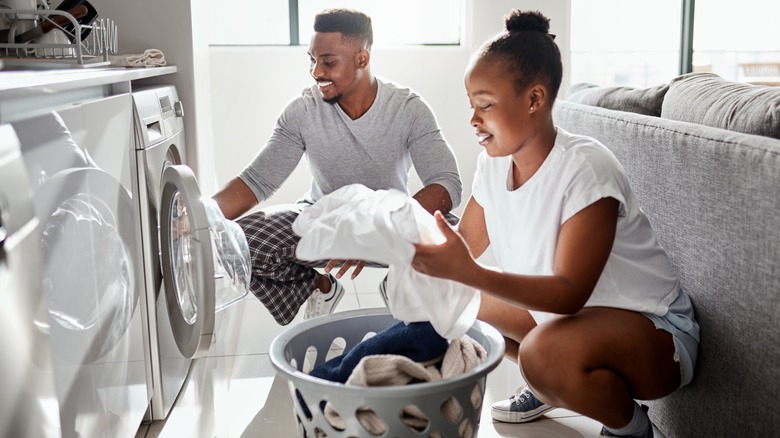This One Simple Thing Can Make Or Break A Happy Marriage
If you're a newlywed, you've most likely heard the inevitable, "How's married life?" question. It may be tempting to respond with, "OMG it's perfect! No complaints here!" But those who ask usually have faded out of the honeymoon phase and experienced what married life can really look like — and it's a little more complicated than feeding each other chocolate-covered strawberries and champagne. Combining your life with another person to create a shared experience that is equal and fulfilling for both partners is a difficult process that takes time and patience.
It's important to understand the ways that marriages are tested and for some, become reasons for divorce: things like infidelity, lack of communication, and financial strain, per Marriage. According to the CDC, nearly 50% of marriages end in divorce. No one wants to think about the ways their marriage might fail, and we don't blame them. But identifying the most common factors that contribute to divorce can help couples avoid those pitfalls in their own relationship. One of the most common reasons for marital trouble may actually surprise you.
Time to break out the chore chart
No one likes to do it, but it's important that it gets done: chores. The Atlantic reports that the distribution of chores and household labor plays a huge role in the happiness and harmony of married couples. Now, this doesn't mean that ignoring the piles of laundry and mountains of dirty dishes in the sink is the way to save your marriage; in fact, the more both partners participate, the better. According to Marriage, one of the top 10 reasons couples get divorced is a lack of equity in the relationship. When this happens, one person in the relationship feels like they hold more responsibility, often leading to resentment, which can ruin even the strongest of relationships.
A poll done in 2007 by the Pew Research Center asked, "What makes a marriage work?" Feedback showed that sharing household chores came in third place, beating out shared interests and beliefs, and even being on the same page about wanting and raising children. One of the ways to encourage equal division of labor is to communicate your expectations for one another openly and create common goals for the household.
The Atlantic notes that collaborating without criticizing and creating a system that works for both individuals is the key balance for most couples that prioritize equity. While creating this system is important, the mental load still often falls on one partner — usually the woman — to distribute the labor, which can further resentment in a marriage.
Marriage is like a house – both partners need to clean it
Unfortunately, traditional gender roles still play a large factor in the distribution of household chores in heterosexual relationships. According to The Guardian, although women now make up approximately half of the workforce, the majority of household chores, childcare, and managing the division of labor still fall on the woman. According to a Gallup poll in 2019, women were still largely responsible (over 60% in most cases) for things like cooking, cleaning, and doing laundry. This can lead to women resenting their partners for their lack of help around the house, with no real model for how to change the dynamic.
Luckily, times are changing, and more men view household equity as an important part of a happy marriage. The Pew Research Center reported that 62% of men say sharing household chores is "very important to marital success." Per The Atlantic, "Men's participation in housework in U.S. families has nearly doubled in the past 40 years, and their amount of time spent on childcare has tripled." Some men even desire the stay-at-home title, as Shannon Carpenter, author of "The Ultimate Stay-At-Home Dad" discusses in his book. He told CNN that the arrangement worked for his family. "My decision to become a stay-at-home dad has made our life less stressful and thus more enjoyable for everyone." While the stay-at-home dad or husband might not be everyone's optimal dynamic, even working partners agree that it is important both parties equally tackle household responsibilities.


